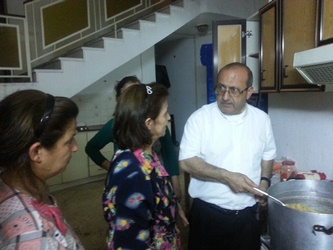|
ISIS took everything they had--now Iraqi Christians have found refuge in Jordan "I left my home in Mossul on July 18. Perhaps for ever. Who can say?" By Oliver Maksan Raed is in his mid 40s. But when he is telling his story he looks much older than that. Weeks of fear and uncertainty have left the mark on the Chaldean Catholic from Mossul. “We have been fleeing from ISIS for a month,” he says tiredly, and draws on a cigarette. “I left my home in Mossul on July 18. Perhaps for ever. Who can say?” Prior to that, the Jihadists had confronted the Christians of Mossul with the notorious ultimatum: convert to Islam, pay the capitation tax for Christians or face death, the extremists had declared. But an ultimatum from the self-proclaimed Caliph Ibrahim permitted the Christians to leave the district in advance. The price was that they must leave behind everything they had. Raed tells his story: “My house was marked with an ‘N’ to show that Christians lived in it and that it was now in the possession of the Islamic State. Then, one day before the expiry of the ultimatum, we fled. When we reached the ISIS check points they took everything – laptop, camera and all the cash I possessed. That was the capitation tax that was due from Christians, they said. My six-year-old son is hard of hearing, and they even stole the batteries from his hearing aid. Can you imagine that?”
When Raed protested, the bearded men threatened him with heavy machine guns; either he obeyed or they would immediately take him away. “And it is not hard to imagine what would happen then,” he says. Having thus barely escaped with his life and that of his family – his wife and three small children – they found refuge in Erbil, the capital of the Kurdish Autonomous Region in northern Iraq. The city is hardly more than two hours drive from Mossul. “There we had to sleep in the open. There were so many refugees. The Church supplied us with the most necessary provisions such as rice and other food. But when Erbil also appeared to come under threat from ISIS for a time, I just wanted to get out of Iraq.” The family man had to take a loan to finance the journey out of the country for himself and his loved ones. The destination was the neighbouring country of Jordan. They reached Amman Aug. 18. “I am very grateful to the King of Jordan for accepting us here. Here, for the first time, we feel safe.” As well as with Raed and his family, Pastor Khalil Jaar has taken about a hundred other Iraqi refugees into his parish in Amman since the middle of August. Mattresses and suitcases belonging to the new arrivals are piled in the parish hall. All of them came from Mossul and its surroundings. But it is not the first time that refugees have come knocking on his door. The Catholic priest has been giving shelter to oppressed Christians in the Middle East for years. “First came the Iraqis after 2003. Then we took in Syrians trying to escape from the war in their homeland. And now a new wave of Christian Iraqis is arriving here. Our King has provisionally offered to accept some 500 Christian families from Iraq. If all goes well, about 1,500 further families will follow,” he says. “These people are totally exhausted. The old people just want to sleep, because they have been fleeing for weeks. The women and children cry a lot. Their experiences have been dramatic and they are completely traumatized. A young woman told me in tears how she had to watch while an ISIS man ripped the gold earring from the ear of a two-year-old girl, shouting: ‘That belongs to the Islamic State.’ “Naturally the people are scarred by this. The children cry when they hear the aircraft at the nearby airport. They think they are bombers. As soon as they have settled in here a bit, I will try to provide them with psychological help. “I try to support the people not only in terms of their material needs. I am also concerned to give them psychological strength. We try to give the children distractions, by taking them to an open-air swimming pool for example. But above all I wish to strengthen them in their faith. This is the time to show that we are shepherds who care for Christ’s flock.” Pastor Khalil also calls on the faithful of his parish to be generous to the newcomers. “At every Mass I preach that these are our brethren. The people should re-consider whether they really need all the things that they have, or if they could not share them with the refugees. And the people give help,” the priest says with gratification. “And one can always give a smile.” But Pastor Khalil is thinking beyond the first emergency aid. The refugees will probably have to stay in Jordan for a long time before they can return to Iraq, or – as the majority want – migrate to the West. “The people need health care. And the children must go to school. And, as a Church, we must rely on our own resources. It is not easy to manage all these things. But providence will come to our aid, as it has done in the past.” |
|
|
|

